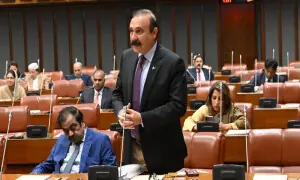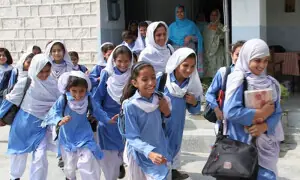UN projects Pakistan's GDP growth at 3.9% in 2022
3 min readPakistan’s GDP growth is projected at 3.9 per cent in 2022, driven by private consumption, record high remittances and fiscal support, says the United Nations in its report, “World Economic Situation and Prospects 2022”.
The report is produced by the United Nations Department of Economic and Social Affairs (UN DESA), in partnership with the United Nations Conference on Trade and Development (UNCTAD) and the five United Nations regional commissions.
“The economy of Pakistan remains on a relatively robust recovery path. After an economic expansion of 4.5 percent in 2021, GDP growth is projected at 3.9 percent in 2022, driven by private consumption, record-high remittances and fiscal support,” the report noted.
The report stated that the central banks of Pakistan and Sri Lanka increased interest rates in the second half of 2021 amid rising inflation and widening current account deficits. Central banks need to assess the magnitude and timing of policy changes to support an inclusive recovery and maintain financial and price stability.
In south Asia, fiscal responses to the crisis were relatively restrained compared to other regions, largely due to sovereign credit ratings and debt-to-GDP ratios. Fiscal policies remain moderately supportive as the recovery gathers pace.
In India and Pakistan, fiscal deficits are projected to decline gradually. At the same time, policy priorities have shifted towards capital expenditure. Pressures for fiscal consolidation will likely increase from higher public debt and rising borrowing cost, it added.
Amid elevated social needs, a still fragile recovery and lagging employment, it is imperative to avoid premature consolidation. The weak debt situation emphasizes the need for revenue mobilisation as well as further multilateral support, especially for countries with elevated sovereign risks.
The report further stated that the G20 Debt Service Suspension Initiative did not provide substantial relief to eligible countries, namely, Afghanistan, Maldives, Nepal, and Pakistan. Relief stood at less than 20 percent of the debt service obligations or about 1.6 per cent of the GDP, on average.
It further stated that Bangladesh, Indonesia, Pakistan, and the Philippines engaged in debt swaps during the 1980s and early 2000s. While these agreements were broadly consistent with national development policies, strong frontloading of counterpart payments reduced fiscal space in Indonesia in the first few years.
The overall impact on public debt reduction was small given the modest scale of debt relief. Learning from past lessons, countries should conduct independent feasibility studies to identify the amount and profile of swappable public debt, beneficiary projects, co-financing sources and the debt discount rate.
Relevant stakeholders could seek to reduce the transaction costs of debt swaps, since elements such as a time-consuming negotiation process, feasibility studies and financial and legal fees can add up to five percent of the debt value.
As of early December 2021, Bangladesh, Nepal, and Pakistan had less than 26 percent of their populations fully vaccinated. By contrast, the fully-vaccinated population is above 64 per cent in Bhutan, Maldives, and Sri Lanka.
In India, a deadly wave of infection with the Delta variant stole 240,000 lives between April and June, and disrupted economic recovery. Similar episodes could take place in the near term, the report added.
The story was originally published in Business Recorder on January 15, 2022.
For the latest news, follow us on Twitter @Aaj_Urdu. We are also on Facebook, Instagram and YouTube.






















Comments are closed on this story.